A Comprehensive Review of Legal and Ethical Compliance Frameworks
VerifiedAdded on 2023/06/15
|9
|1414
|399
Homework Assignment
AI Summary
This assignment delves into the legal and ethical obligations applicable to staff members and organizations within the community service sector, emphasizing adherence to Australian Community Work practice Guidelines, ethical codes, and relevant legislations like the Disability Discrimination Act. It underscores the importance of ethical responsibilities such as confidentiality, accountability, respect, and loyalty. The role of a compliance officer is highlighted, along with the necessity of written policies, communication methods, disciplinary guidelines, and risk management plans. The assignment also identifies scenarios where legal advice is crucial, such as corporate governance, contracts, and labor employment issues, and stresses the need for policies governing ethical considerations like client information confidentiality. Furthermore, it addresses the severe consequences of non-compliance, including monetary fines and imprisonment, and advocates for establishing effective Compliance and Ethics Programs to promote ethical conduct and prevent misconduct. Finally, it outlines steps for managing breaches, ethical considerations for co-workers, key regulatory bodies, and the benefits of organizational accreditation through continuous improvement processes.
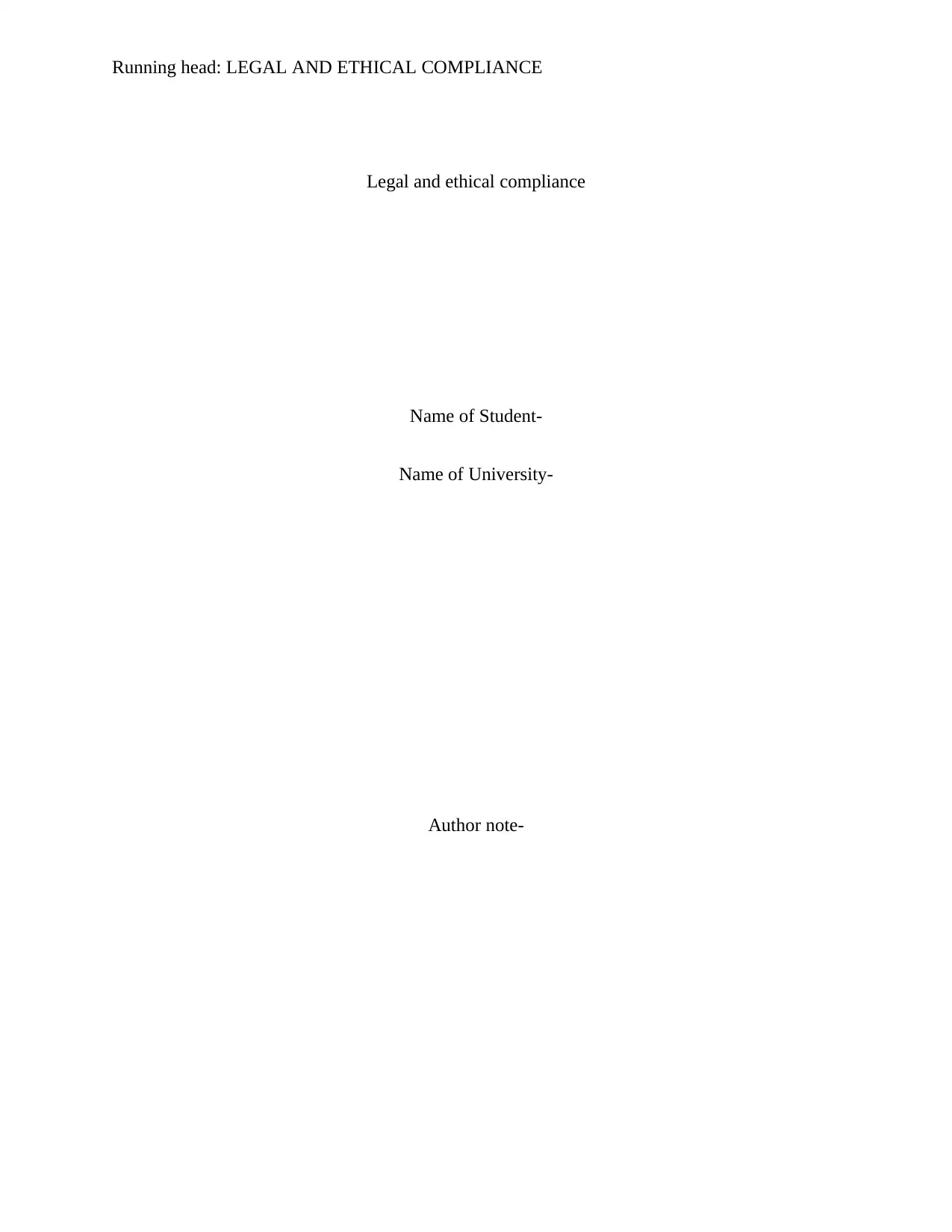
Running head: LEGAL AND ETHICAL COMPLIANCE
Legal and ethical compliance
Name of Student-
Name of University-
Author note-
Legal and ethical compliance
Name of Student-
Name of University-
Author note-
Paraphrase This Document
Need a fresh take? Get an instant paraphrase of this document with our AI Paraphraser
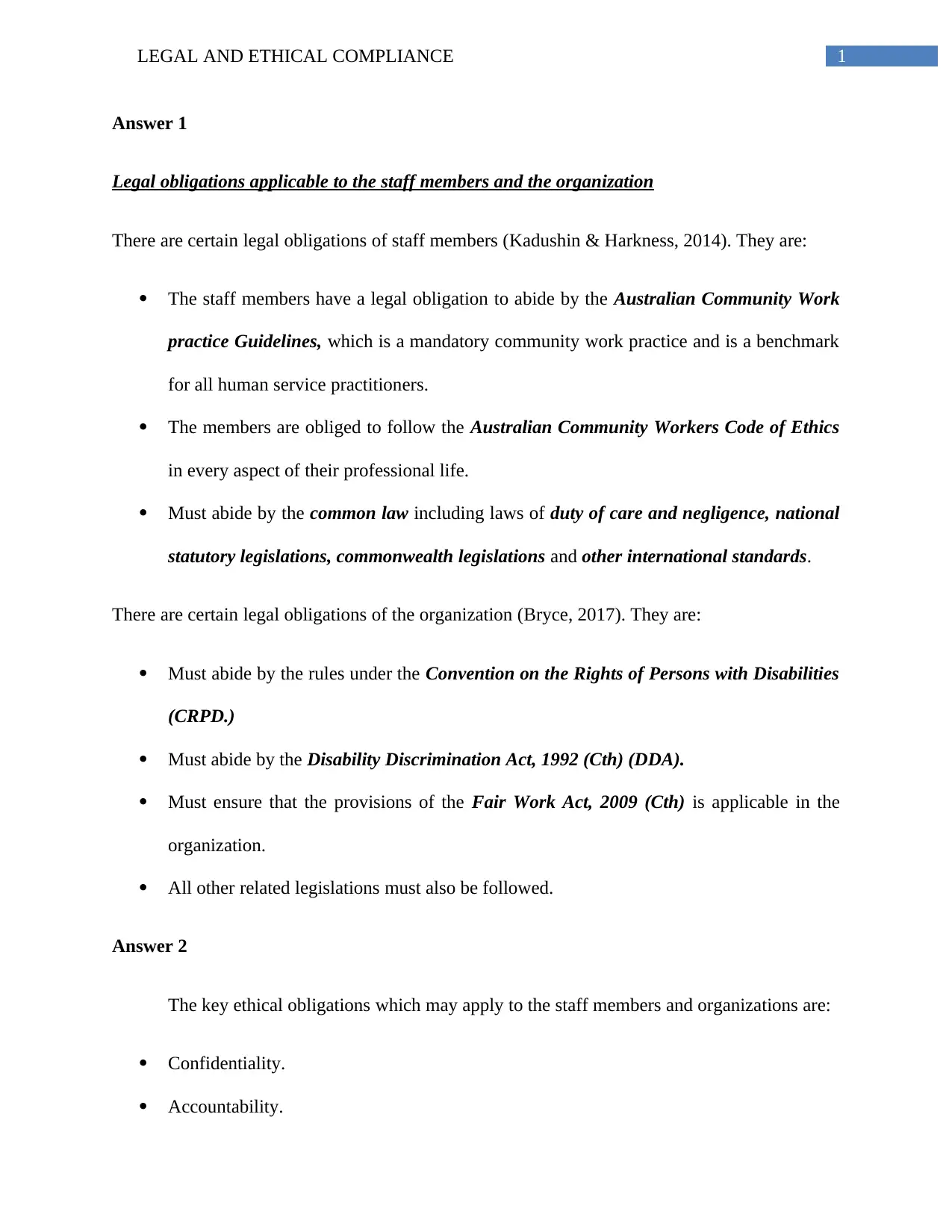
1LEGAL AND ETHICAL COMPLIANCE
Answer 1
Legal obligations applicable to the staff members and the organization
There are certain legal obligations of staff members (Kadushin & Harkness, 2014). They are:
The staff members have a legal obligation to abide by the Australian Community Work
practice Guidelines, which is a mandatory community work practice and is a benchmark
for all human service practitioners.
The members are obliged to follow the Australian Community Workers Code of Ethics
in every aspect of their professional life.
Must abide by the common law including laws of duty of care and negligence, national
statutory legislations, commonwealth legislations and other international standards.
There are certain legal obligations of the organization (Bryce, 2017). They are:
Must abide by the rules under the Convention on the Rights of Persons with Disabilities
(CRPD.)
Must abide by the Disability Discrimination Act, 1992 (Cth) (DDA).
Must ensure that the provisions of the Fair Work Act, 2009 (Cth) is applicable in the
organization.
All other related legislations must also be followed.
Answer 2
The key ethical obligations which may apply to the staff members and organizations are:
Confidentiality.
Accountability.
Answer 1
Legal obligations applicable to the staff members and the organization
There are certain legal obligations of staff members (Kadushin & Harkness, 2014). They are:
The staff members have a legal obligation to abide by the Australian Community Work
practice Guidelines, which is a mandatory community work practice and is a benchmark
for all human service practitioners.
The members are obliged to follow the Australian Community Workers Code of Ethics
in every aspect of their professional life.
Must abide by the common law including laws of duty of care and negligence, national
statutory legislations, commonwealth legislations and other international standards.
There are certain legal obligations of the organization (Bryce, 2017). They are:
Must abide by the rules under the Convention on the Rights of Persons with Disabilities
(CRPD.)
Must abide by the Disability Discrimination Act, 1992 (Cth) (DDA).
Must ensure that the provisions of the Fair Work Act, 2009 (Cth) is applicable in the
organization.
All other related legislations must also be followed.
Answer 2
The key ethical obligations which may apply to the staff members and organizations are:
Confidentiality.
Accountability.
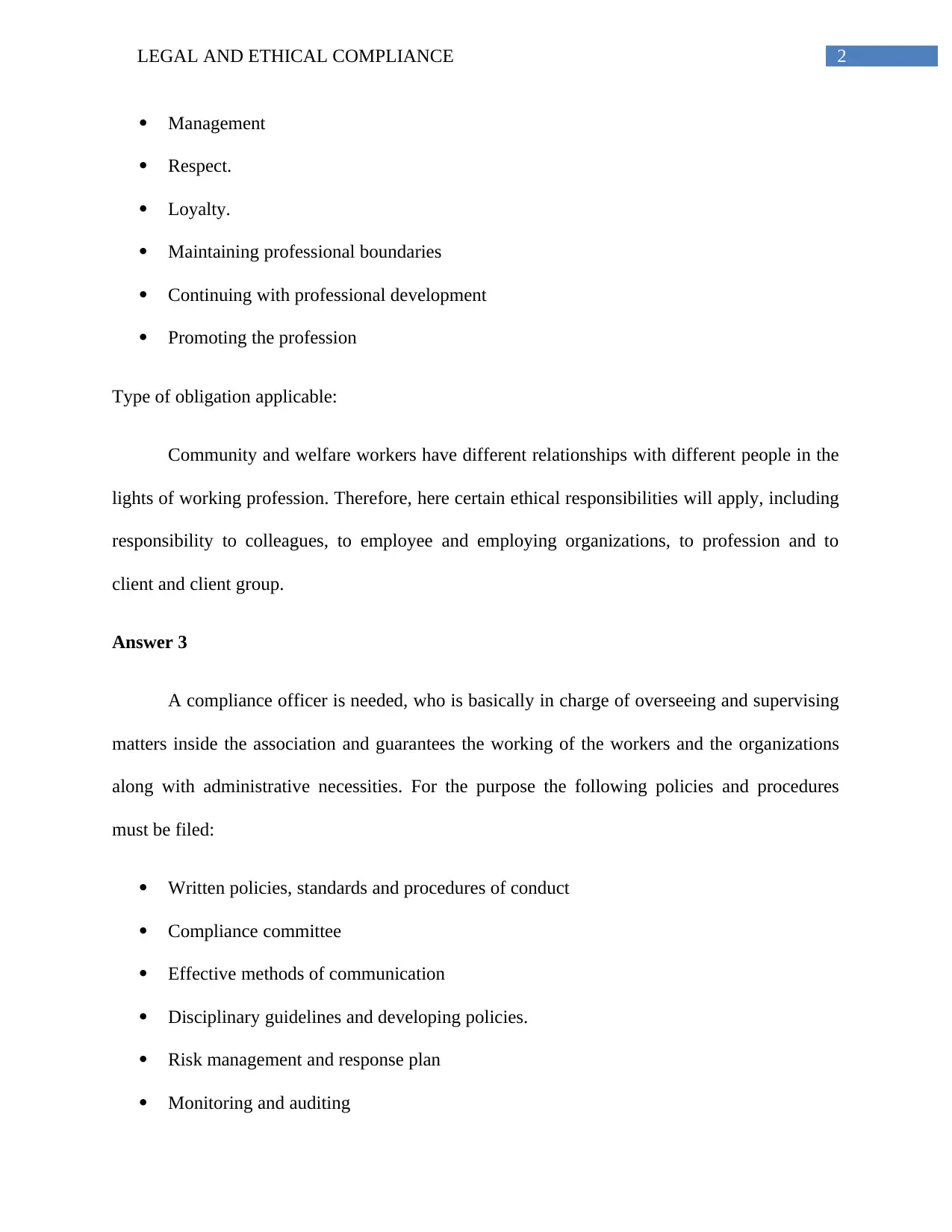
2LEGAL AND ETHICAL COMPLIANCE
Management
Respect.
Loyalty.
Maintaining professional boundaries
Continuing with professional development
Promoting the profession
Type of obligation applicable:
Community and welfare workers have different relationships with different people in the
lights of working profession. Therefore, here certain ethical responsibilities will apply, including
responsibility to colleagues, to employee and employing organizations, to profession and to
client and client group.
Answer 3
A compliance officer is needed, who is basically in charge of overseeing and supervising
matters inside the association and guarantees the working of the workers and the organizations
along with administrative necessities. For the purpose the following policies and procedures
must be filed:
Written policies, standards and procedures of conduct
Compliance committee
Effective methods of communication
Disciplinary guidelines and developing policies.
Risk management and response plan
Monitoring and auditing
Management
Respect.
Loyalty.
Maintaining professional boundaries
Continuing with professional development
Promoting the profession
Type of obligation applicable:
Community and welfare workers have different relationships with different people in the
lights of working profession. Therefore, here certain ethical responsibilities will apply, including
responsibility to colleagues, to employee and employing organizations, to profession and to
client and client group.
Answer 3
A compliance officer is needed, who is basically in charge of overseeing and supervising
matters inside the association and guarantees the working of the workers and the organizations
along with administrative necessities. For the purpose the following policies and procedures
must be filed:
Written policies, standards and procedures of conduct
Compliance committee
Effective methods of communication
Disciplinary guidelines and developing policies.
Risk management and response plan
Monitoring and auditing
⊘ This is a preview!⊘
Do you want full access?
Subscribe today to unlock all pages.

Trusted by 1+ million students worldwide
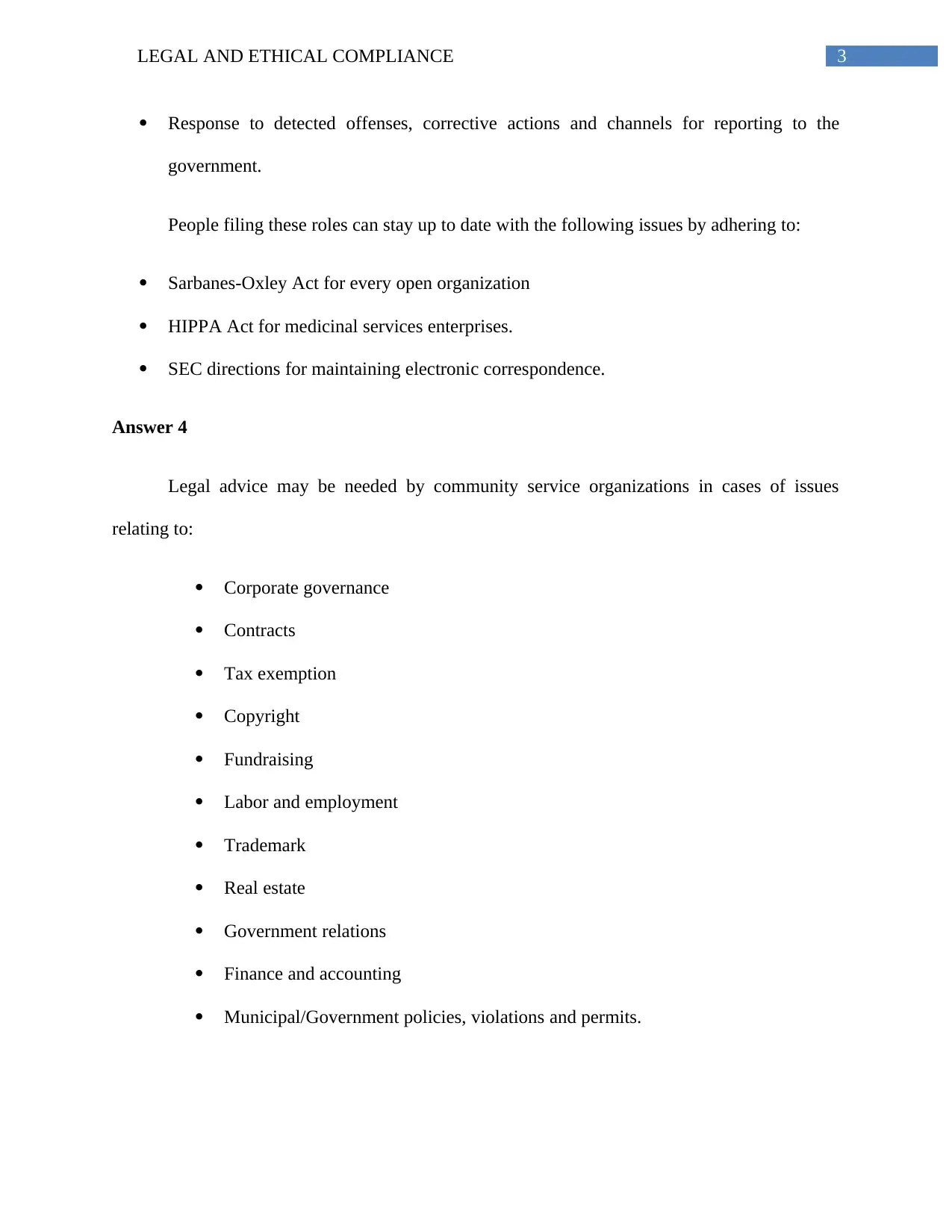
3LEGAL AND ETHICAL COMPLIANCE
Response to detected offenses, corrective actions and channels for reporting to the
government.
People filing these roles can stay up to date with the following issues by adhering to:
Sarbanes-Oxley Act for every open organization
HIPPA Act for medicinal services enterprises.
SEC directions for maintaining electronic correspondence.
Answer 4
Legal advice may be needed by community service organizations in cases of issues
relating to:
Corporate governance
Contracts
Tax exemption
Copyright
Fundraising
Labor and employment
Trademark
Real estate
Government relations
Finance and accounting
Municipal/Government policies, violations and permits.
Response to detected offenses, corrective actions and channels for reporting to the
government.
People filing these roles can stay up to date with the following issues by adhering to:
Sarbanes-Oxley Act for every open organization
HIPPA Act for medicinal services enterprises.
SEC directions for maintaining electronic correspondence.
Answer 4
Legal advice may be needed by community service organizations in cases of issues
relating to:
Corporate governance
Contracts
Tax exemption
Copyright
Fundraising
Labor and employment
Trademark
Real estate
Government relations
Finance and accounting
Municipal/Government policies, violations and permits.
Paraphrase This Document
Need a fresh take? Get an instant paraphrase of this document with our AI Paraphraser

4LEGAL AND ETHICAL COMPLIANCE
They require legal help in case of such issues because organizations working in fields like
healthcare, education and environment as various legal aspects are related to these fields.
Answer 5
Organizations should have policies and procedures in place in governing ethical issues to
regulate confidentiality and privacy of client information, so that the organizations can provide
effective and efficient professional services (Tricker & Tricker, 2015). These policies and
procedures must address areas like:
Client information confidentiality.
Networking with other agencies.
Information sharing with other services and roles and responsibilities of each service.
Preservation period of client information.
Referral protocols.
Answer 6
The consequences of non-compliance with legal and ethical standards by workers and
organizations are highly severe. It may lead to a high amount of monetary fine, long term
imprisonment or both. The laws are strict regarding non-compliance and non-compliance by
workers can also result in their termination and criminal breach as well.
Answer 7
They require legal help in case of such issues because organizations working in fields like
healthcare, education and environment as various legal aspects are related to these fields.
Answer 5
Organizations should have policies and procedures in place in governing ethical issues to
regulate confidentiality and privacy of client information, so that the organizations can provide
effective and efficient professional services (Tricker & Tricker, 2015). These policies and
procedures must address areas like:
Client information confidentiality.
Networking with other agencies.
Information sharing with other services and roles and responsibilities of each service.
Preservation period of client information.
Referral protocols.
Answer 6
The consequences of non-compliance with legal and ethical standards by workers and
organizations are highly severe. It may lead to a high amount of monetary fine, long term
imprisonment or both. The laws are strict regarding non-compliance and non-compliance by
workers can also result in their termination and criminal breach as well.
Answer 7
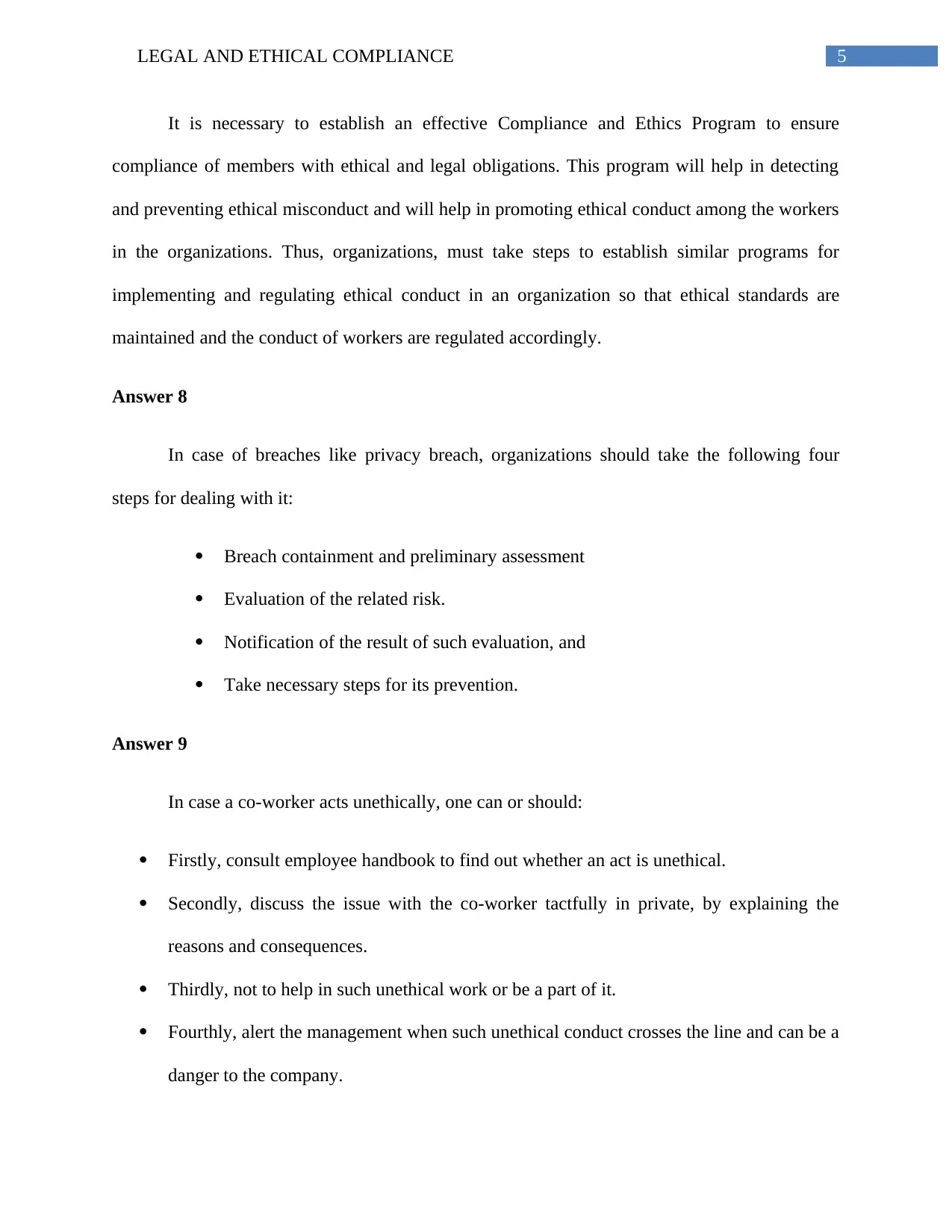
5LEGAL AND ETHICAL COMPLIANCE
It is necessary to establish an effective Compliance and Ethics Program to ensure
compliance of members with ethical and legal obligations. This program will help in detecting
and preventing ethical misconduct and will help in promoting ethical conduct among the workers
in the organizations. Thus, organizations, must take steps to establish similar programs for
implementing and regulating ethical conduct in an organization so that ethical standards are
maintained and the conduct of workers are regulated accordingly.
Answer 8
In case of breaches like privacy breach, organizations should take the following four
steps for dealing with it:
Breach containment and preliminary assessment
Evaluation of the related risk.
Notification of the result of such evaluation, and
Take necessary steps for its prevention.
Answer 9
In case a co-worker acts unethically, one can or should:
Firstly, consult employee handbook to find out whether an act is unethical.
Secondly, discuss the issue with the co-worker tactfully in private, by explaining the
reasons and consequences.
Thirdly, not to help in such unethical work or be a part of it.
Fourthly, alert the management when such unethical conduct crosses the line and can be a
danger to the company.
It is necessary to establish an effective Compliance and Ethics Program to ensure
compliance of members with ethical and legal obligations. This program will help in detecting
and preventing ethical misconduct and will help in promoting ethical conduct among the workers
in the organizations. Thus, organizations, must take steps to establish similar programs for
implementing and regulating ethical conduct in an organization so that ethical standards are
maintained and the conduct of workers are regulated accordingly.
Answer 8
In case of breaches like privacy breach, organizations should take the following four
steps for dealing with it:
Breach containment and preliminary assessment
Evaluation of the related risk.
Notification of the result of such evaluation, and
Take necessary steps for its prevention.
Answer 9
In case a co-worker acts unethically, one can or should:
Firstly, consult employee handbook to find out whether an act is unethical.
Secondly, discuss the issue with the co-worker tactfully in private, by explaining the
reasons and consequences.
Thirdly, not to help in such unethical work or be a part of it.
Fourthly, alert the management when such unethical conduct crosses the line and can be a
danger to the company.
⊘ This is a preview!⊘
Do you want full access?
Subscribe today to unlock all pages.

Trusted by 1+ million students worldwide
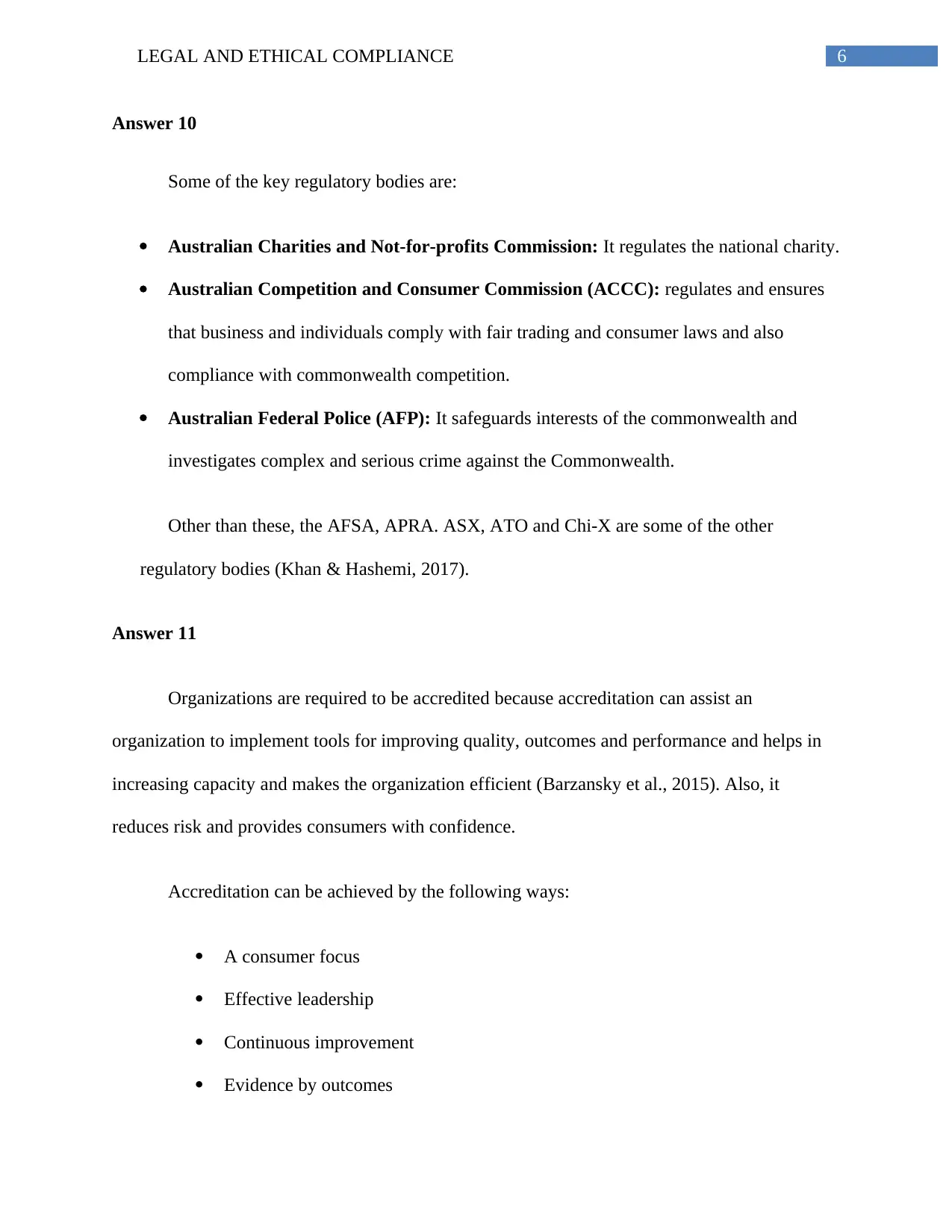
6LEGAL AND ETHICAL COMPLIANCE
Answer 10
Some of the key regulatory bodies are:
Australian Charities and Not-for-profits Commission: It regulates the national charity.
Australian Competition and Consumer Commission (ACCC): regulates and ensures
that business and individuals comply with fair trading and consumer laws and also
compliance with commonwealth competition.
Australian Federal Police (AFP): It safeguards interests of the commonwealth and
investigates complex and serious crime against the Commonwealth.
Other than these, the AFSA, APRA. ASX, ATO and Chi-X are some of the other
regulatory bodies (Khan & Hashemi, 2017).
Answer 11
Organizations are required to be accredited because accreditation can assist an
organization to implement tools for improving quality, outcomes and performance and helps in
increasing capacity and makes the organization efficient (Barzansky et al., 2015). Also, it
reduces risk and provides consumers with confidence.
Accreditation can be achieved by the following ways:
A consumer focus
Effective leadership
Continuous improvement
Evidence by outcomes
Answer 10
Some of the key regulatory bodies are:
Australian Charities and Not-for-profits Commission: It regulates the national charity.
Australian Competition and Consumer Commission (ACCC): regulates and ensures
that business and individuals comply with fair trading and consumer laws and also
compliance with commonwealth competition.
Australian Federal Police (AFP): It safeguards interests of the commonwealth and
investigates complex and serious crime against the Commonwealth.
Other than these, the AFSA, APRA. ASX, ATO and Chi-X are some of the other
regulatory bodies (Khan & Hashemi, 2017).
Answer 11
Organizations are required to be accredited because accreditation can assist an
organization to implement tools for improving quality, outcomes and performance and helps in
increasing capacity and makes the organization efficient (Barzansky et al., 2015). Also, it
reduces risk and provides consumers with confidence.
Accreditation can be achieved by the following ways:
A consumer focus
Effective leadership
Continuous improvement
Evidence by outcomes
Paraphrase This Document
Need a fresh take? Get an instant paraphrase of this document with our AI Paraphraser
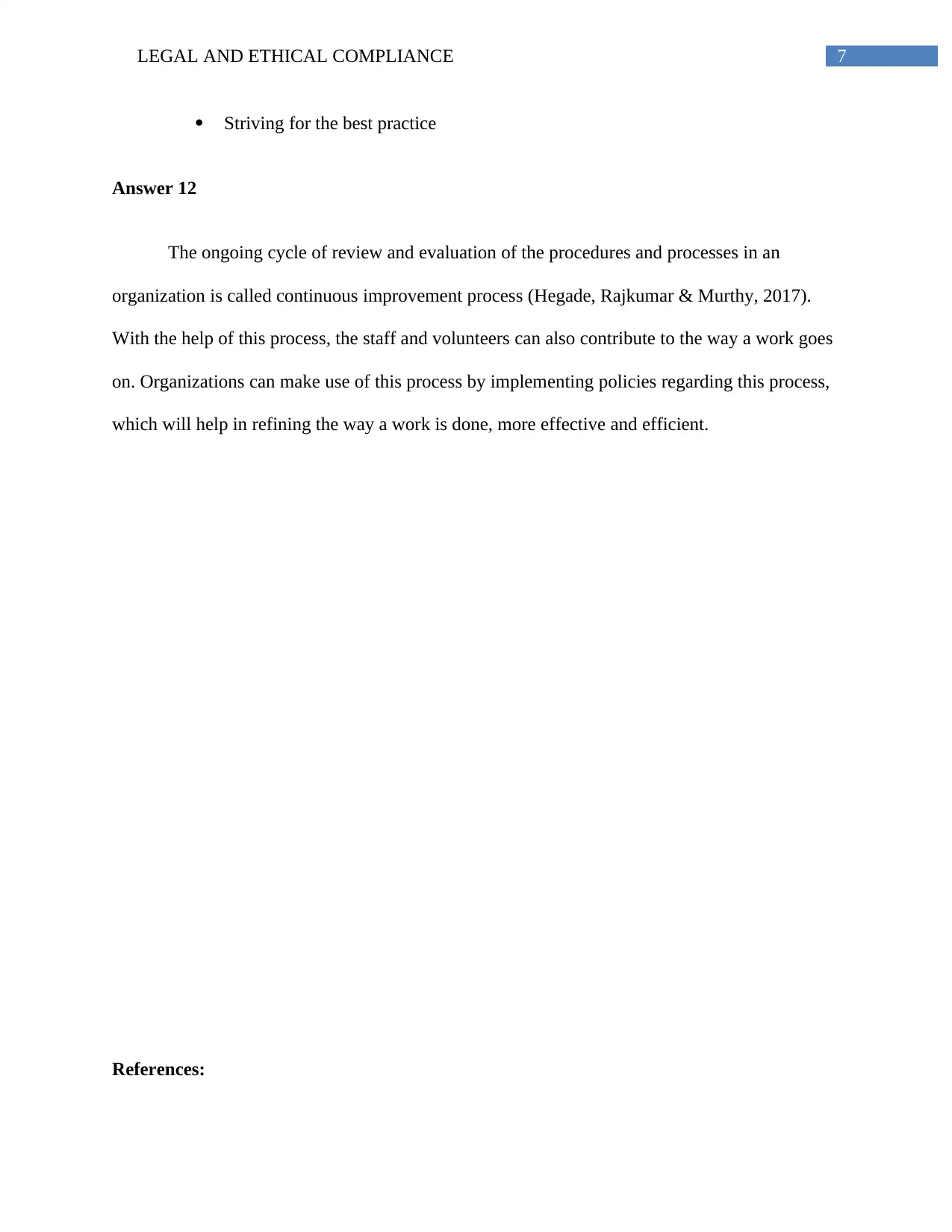
7LEGAL AND ETHICAL COMPLIANCE
Striving for the best practice
Answer 12
The ongoing cycle of review and evaluation of the procedures and processes in an
organization is called continuous improvement process (Hegade, Rajkumar & Murthy, 2017).
With the help of this process, the staff and volunteers can also contribute to the way a work goes
on. Organizations can make use of this process by implementing policies regarding this process,
which will help in refining the way a work is done, more effective and efficient.
References:
Striving for the best practice
Answer 12
The ongoing cycle of review and evaluation of the procedures and processes in an
organization is called continuous improvement process (Hegade, Rajkumar & Murthy, 2017).
With the help of this process, the staff and volunteers can also contribute to the way a work goes
on. Organizations can make use of this process by implementing policies regarding this process,
which will help in refining the way a work is done, more effective and efficient.
References:
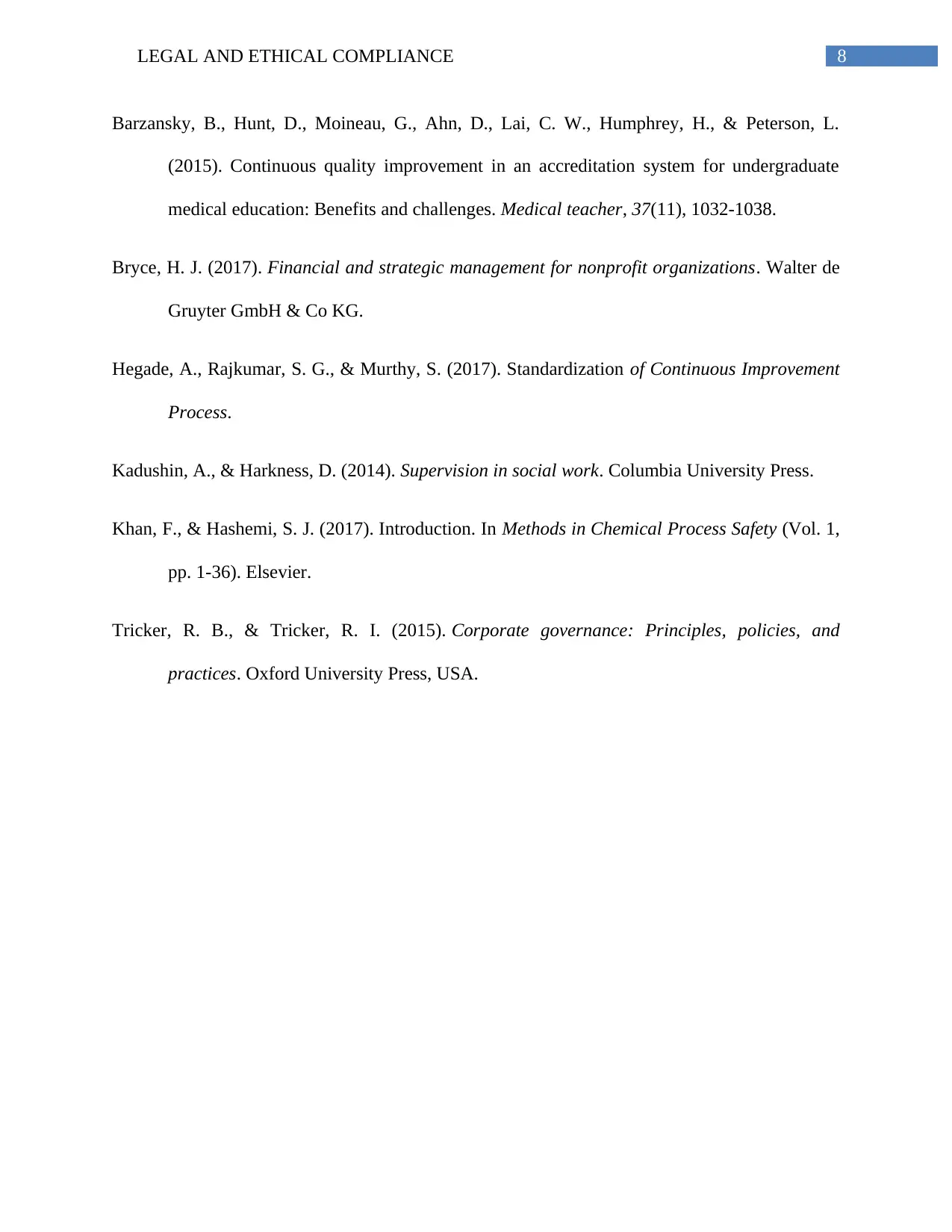
8LEGAL AND ETHICAL COMPLIANCE
Barzansky, B., Hunt, D., Moineau, G., Ahn, D., Lai, C. W., Humphrey, H., & Peterson, L.
(2015). Continuous quality improvement in an accreditation system for undergraduate
medical education: Benefits and challenges. Medical teacher, 37(11), 1032-1038.
Bryce, H. J. (2017). Financial and strategic management for nonprofit organizations. Walter de
Gruyter GmbH & Co KG.
Hegade, A., Rajkumar, S. G., & Murthy, S. (2017). Standardization of Continuous Improvement
Process.
Kadushin, A., & Harkness, D. (2014). Supervision in social work. Columbia University Press.
Khan, F., & Hashemi, S. J. (2017). Introduction. In Methods in Chemical Process Safety (Vol. 1,
pp. 1-36). Elsevier.
Tricker, R. B., & Tricker, R. I. (2015). Corporate governance: Principles, policies, and
practices. Oxford University Press, USA.
Barzansky, B., Hunt, D., Moineau, G., Ahn, D., Lai, C. W., Humphrey, H., & Peterson, L.
(2015). Continuous quality improvement in an accreditation system for undergraduate
medical education: Benefits and challenges. Medical teacher, 37(11), 1032-1038.
Bryce, H. J. (2017). Financial and strategic management for nonprofit organizations. Walter de
Gruyter GmbH & Co KG.
Hegade, A., Rajkumar, S. G., & Murthy, S. (2017). Standardization of Continuous Improvement
Process.
Kadushin, A., & Harkness, D. (2014). Supervision in social work. Columbia University Press.
Khan, F., & Hashemi, S. J. (2017). Introduction. In Methods in Chemical Process Safety (Vol. 1,
pp. 1-36). Elsevier.
Tricker, R. B., & Tricker, R. I. (2015). Corporate governance: Principles, policies, and
practices. Oxford University Press, USA.
⊘ This is a preview!⊘
Do you want full access?
Subscribe today to unlock all pages.

Trusted by 1+ million students worldwide
1 out of 9
Related Documents
Your All-in-One AI-Powered Toolkit for Academic Success.
+13062052269
info@desklib.com
Available 24*7 on WhatsApp / Email
![[object Object]](/_next/static/media/star-bottom.7253800d.svg)
Unlock your academic potential
Copyright © 2020–2026 A2Z Services. All Rights Reserved. Developed and managed by ZUCOL.





